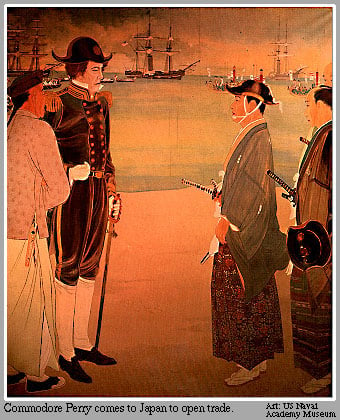|
WWII Home / Pearl Harbor Home
Then, in 1853, a small fleet of American warships commanded
by Commodore Matthew Perry steamed into the bay at Edo (now
Tokyo). The "black ships," as the Japanese
described them at the time, had come to open trade
with other nations. Threatened by the big warships, Japan
signed a trade treaty with the U.S. Within five years of
Perry's visit, Japan signed trade treaties with Great
Britain, Russia, France, and Holland. Japan's long
isolation was finally at an end.
Some historians have criticized the U.S. for sending Perry
to Japan. They believe it was not America's right to
"open" a nation that wished to be left alone.
Why did America decide to go to Japan to open trade? How do you think the Japanese felt? Why did the Japanese stay isolated for so long? Would you have entered Japan?
Treaty - a formal agreement between two or more countries. Interview with the Eyewitnesses | Teacher's Guide |

 From the early 1600s to the mid-1800s the Pacific island
nation of
From the early 1600s to the mid-1800s the Pacific island
nation of